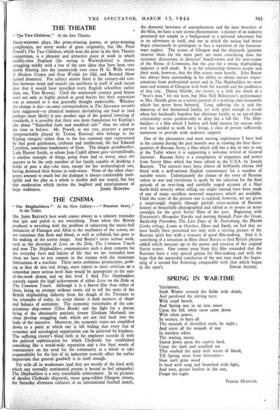THE CINEMA
MR. JOHN BAXTER'S best work comes always as a salutary reminder that spit and polish is not everything. Even when this British producer is wrestling with the problem of subjecting the music-hall intimacies of Flanagan and Allen to the mechanics of the screen, we are conscious that flesh and blood, as well as celluloid, has gone to the making of the screen image. And Baxter's more serious work, such as the direction of Love on the Dole, The Common Touch and now The Shipbuilders, communicates such a deep concern for the everyday facts and fancies of life that we are reminded how often we have to rest content in the cinema with the inanimate fabrications of a machine. These more ambitious productions, prob- ing as they do into real things, must expect to meet criticism on a somewhat more serious level than would be appropriate to the run- of-the-week drama, and on this level I find The Shipbuilders scarcely equals the high' achievement of either Love on the Dole or The Common Touch. Although it is a braver film than either of these, being an attempt without erotic aid to tell the story of the British shipbuilding industry from the slough of the Twenties to the. triumphs of today, its script denies it both neatness of shape and balance of sentiment. The economic vicissitudes of the con- scientious ship-owner (Clive Brook) and the fight for a decent living of the obstinately patriotic riveter (Graham Morland) too often develop straggling ends which are not. tied back into the body of the narrative. Moreover, the economic issues are simplified down to a point at which one is left feeling that every feat of economic and sociological organisation can be achieved by kindness. The suffering riveter's blind faith in his employer accords ill with the political sophistication for which 'Clydeside has established something like a world-wide reputation and a few final words of commentary on the need for the community as a whole to take responsibility for the fate of its industries scarcely offset the earlier impression that general goodwill is in itself enough.
Yet with all its weaknesses (and they are mostly of the kind with which any normally sentimental person is bound to feel sympathy)
The Shipbuilders is a very remarkable achievement. In its pictures of derelict Clydeside shipyards, mean gang-ridden Glasgow streets, the Saturday afternoon catharsis of an international football match, the domestic heroisms of unemployment and the later braveties of the blitz, we have a rare screen phenomenon: a picture of an industry presented not simply as a background to a personal adventure but as an adventure in itself, and one in which the nation had better begin consciously to participate or face a repetition of the between- wars neglect. The scenes of Glasgow and the shipyards (genuine exterior shots for the most part) are more convincing than the economic discussions in directors' hoard-rooms and the ante-rooms of the House of Commons, but the case for a strong shipbuilding industry is well made. It is in the relationship between people and their work, however, that the film scores most heavily. John Baxter has always been outstanding in his ability to obtain sincere imper- sonations from professional actors and in The Shipbuilders we meet men and women of Glasgow with both the warmth and the pawkiness of that city. Danny Shields, the riveter, is a little too much of a " boss's man " for my taste, but Miss Nell Ballantync's performance as Mrs. Shields gives us a screen portrait of a working-class housewife which has never been bettered. Long suffering she is and the mainstay of her threatened family, yet with spirit enough to revolt when her husband's hopeless but obstinate loyalty to an out-of-date relationship seems permanently to deny her a full life. The Ship- builders is a film which I believe will hold interest for anyone who ever has needed to work for a living, a class of person sufficiently numerous to provide wide audience support.
One of the pleasantest and most moving experiences I have had in the cinema during the past months was in viewing the first three- quarters of Russian Story, a film which still has a day or two to run at the Tatler where it is supporting a welcome revival of General Suvorov. Russian Story is a compilation of sequences and scenes from Soviet films which has been edited in the U.S.A. by Joseph Burstyn. The extracts have been almost all brilliantly chosen and fitted with a well-written English commentary for a number of suitable voices. Unfortunately the climax of the story of Russian valour in war and revolution is spoilt by the selection for the final episode of an over-long and carefully staged account of a Nazi battle-field atrocity when telling use might instead have been made of one of many excellent newsreel sequences which are available. Until the story of the present war is reached, however, we are given a surprisingly shapely (though partial) cross-section of Russian history so beautifully photographed and edited as to arouse an acute nostalgia for the great Soviet films of the past. Beginning with Eisenstein's Alexander Nevsky and moving through Peter the Great, Battleship Potemkin, The Last Days of St. Petersburg, the Maxim Gorky trilogy, Lenin in October, Shors and Earth, we feel that we have finally been presented not only with a stirring picture of the Russian spirit but with a treasury of good film-making. And it is something of a sensation in films about Russia to find British phrases added which measure up to the power and emotion of the original Soviet scenes. One comes away from this film reminded that the Russians have a very special genius for film-making and with the hope that the successful conclusion of the war may mark the begin- ning of a second fine flowering comparable with that which began
in the two's.
EDGAR ANSTEY.


























 Previous page
Previous page